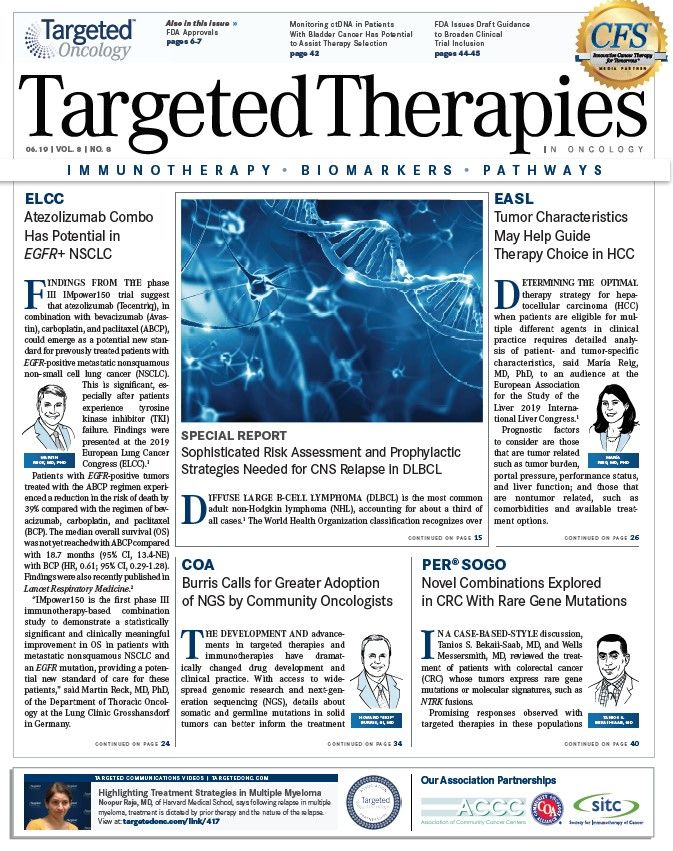Costs at Hospital-Based Oncology Practices Continue to Outpace Those of Community Cancer Clinics
In the current oncology climate, the search for affordable access to cancer care is a growing concern because of the steep price of treatment advancements, inpatient, outpatient, and ED costs, and financial bankruptcy or mergers that limit the number of community cancer clinics. During the 2019 Community Oncology Alliance annual conference in Orlando, Florida, Lucio N. Gordan, MD, of Florida Cancer Specialists & Research Institute addressed the complex challenges faced by community oncology clinics.
Lucio N. Gordan, MD
Lucio N. Gordan, MD

When it comes to the various costs of cancer care, including chemotherapy, immunotherapy, emergency department (ED) visits, outpatient care, daily expenditures, and 6-month expenditures, hospital-based practices continue to be outperformed by community cancer clinics. In the current oncology climate, the search for affordable access to cancer care is a growing concern because of the steep price of treatment advancements, inpatient, outpatient, and ED costs, and financial bankruptcy or mergers that limit the number of community cancer clinics. During the 2019 Community Oncology Alliance (COA) annual conference in Orlando, Florida, Lucio N. Gordan, MD, of Florida Cancer Specialists & Research Institute (FCS) addressed the complex challenges faced by community oncology clinics.1
He presented evidence from 3 studies suggesting that maintaining and providing support to community cancer centers is a way to provide access to affordable cancer care, especially in rural areas. In the first study, Gordan et al2observed significantly increased costs of care for patients with breast, lung, and colorectal cancers treated at hospital-based clinics versus those treated at community-based clinics, largely driven by the increased costs of chemotherapy and provider visits in hospital-based clinics. “Across all cancer types there was no difference in how sick the patients were who received cancer treatment in the community versus hospital-based setting,” said Gordan, president and managing physician at FCS.
The investigators reviewed a 10% random sample of medical and pharmacy claims obtained from the IMS LifeLink database, which includes more than 80 million patients enrolled in 70 health plans. The patient insurance mix in this database was a combination of 80% commercial, 3% Medicaid, 1.7% Medicare, and other insurance types. In the study, 6675 patients were matched 2:1, with 4450 patients in the community oncology setting and 2225 patients in the hospital-based setting.
In patients with breast, lung, or colorectal cancer, the mean total cost, defined as medical plus pharmacy costs per patient per month (PPPM), for chemotherapy in the community setting was $12,548; in the hospital-practice setting, the mean total cost for chemotherapy was $20,060 (P<.001).
Regardless of whether branded chemotherapy agents, generic agents, or a combination was used, the mean PPPM costs in the community setting ($6674; $2936; and $11,080, respectively) were lower than in the hospital-based setting ($10,900; $5134; and $19,412, respectively). Gordan reported that the mean PPPM costs for inpatient care, ED visits, and outpatient care in the community setting were $1178, $121, and $3838, respectively. In the hospital setting, those costs were $1498, $168, and $3912.
The rates of hospitalization 72 hours and 10 days post chemotherapy were similar across all patients, said Gordan. Further investigation showed that rates of ED visits during those time frames were significantly lower in the community setting versus the hospital-based setting (within 72 hours: 2.6% vs 3.6%, respectively;P= .0055; within 10 days: 7.9% vs 9.8%;P= .0022).
Winn et al3reviewed spending on chemotherapy by commercial insurers from 2004 to 2014 based on site of care. To compare hospital-outpatient department versus community- based physician office claims, the investigators reviewed 533,042 patients from the MarketScan Commercial Claims and Encounters Database. After exclusion and inclusion criteria were applied to the claims, 283,502 patients were eligible for the trial. Investigators reviewed line-item drug levels, day levels (the sum of all items on the day of chemotherapy), and the sum of all items within 6 months after treatment initiation.
Drug-level expenditures were $1466 for office-based practices versus $3799 for hospital-based settings (P <.001); day-level expenditures were $3502 versus $7973, respectively (P <.001); and 6-month treatment- episode expenditures demonstrated a similar relationship: $43,700 versus $84,660 (P<.001).1 The investigators determined that hospital-based chemotherapy delivery was much costlier than that in the physician-office setting. Drug-level expenditures were 159% higher for hospital-based settings than for office-based practices ($3799 vs $1466;P<.001); day-level expenditures were 128% higher ($7973 vs $3502; P <.001); and 6-month expenditures were 94% higher ($84,660 vs $43,700;P <.001).1
Gordan et al4collected cost data for 3135 patients with nonsmall cell lung cancer, squamous cell carcinoma of the head and neck, bladder cancer, renal cell carcinoma, or melanoma who received pembrolizumab (Keytruda), nivolumab (Opdivo), and/or ipilimumab (Yervoy) between January 1, 2015, and February 14, 2017. Cost PPPM was calculated and patients were stratified based on cancer type, specific immuno-oncology therapy, receipt of radiation therapy, evidence of metastatic disease, gender, age, and evidence of surgery in the preindex period.
The investigators found that patients treated in community-based settings had lower mean total PPPM cost compared with those treated in hospital-based clinics ($22,685 vs $26,343,P <.001). The major driver of cost differential was lower PPPM medical cost in the community versus hospital setting ($21,382 vs $24,831,P <.001). The authors concluded that regardless of cancer type or immuno-oncology treatment, lower costs were seen in the community versus the hospital-based setting.
“Understanding health care costs, and cancer care costs specifically, is complex and headache-inducing,” said Gordan. “It is going to take all playersphysicians, pharmaceutical partners, payors, hospitals—to find solutions proactively.”
References
1. Gordan LN. Site of care cost analysis: true value of community oncology. Presented at: the 2019 Community Oncology Alliance annual meeting; Orlando, FL; April 3-5, 2019. communityoncology.org/downloads/conference/2019Presentations/thursday/advocacy/Thurs_1150am_Advocacy.pdf.
2. Gordan L, Blazer M, Saundankar V, Kazzaz D, Weidner S, Eaddy M. Cost differences associated with oncology care delivered in a community setting versus a hospital setting: a matched-claims analysis of patients with breast, colorectal, and lung cancers [printed online October 31, 2018].J Oncol Pract. doi: 10.1200/JOP.17.00040.
3. Winn AN, Keating NL, Trogdon JG, Basch EM, Dusetzina SB. Spending by commercial insurers on chemotherapy based on site of care, 2004-2014.JAMA Oncol. 2018;4(4):580-581. doi: 10.1001/jamaoncol.2017.5544.
4. Gordan LN, Blazer M, Saundankar V, Kazzaz D, Weidner S, Eaddy M. Cost differential of immuno-oncology therapy delivered at community versus hospital clinics.Am J Manag Care. 2019;25(3):e66-e70.

Survivorship Care Promotes Evidence-Based Approaches for Quality of Life and Beyond
March 21st 2025Frank J. Penedo, PhD, explains the challenges of survivorship care for patients with cancer and how he implements programs to support patients’ emotional, physical, and practical needs.
Read More